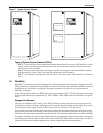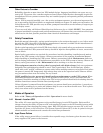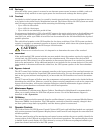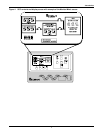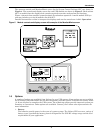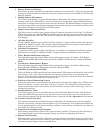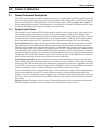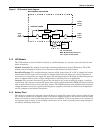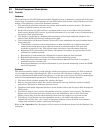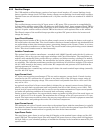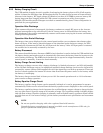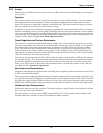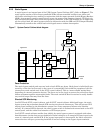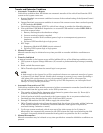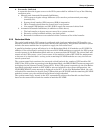
Theory of Operation
12
2.2 Detailed Component Descriptions
2.2.1 Controls
Hardware
The Liebert Series 610 UPS Operator Interface Display System is designed to provide all of the infor-
mation that is required for the operation of each UPS cabinet (the System Control Cabinet and each
module). The following is a list of the hardware features:
1. The control logic performs automatic operations with minimal operator interface. The limited
number of manual controls are easy-to-use.
2. Each Liebert Series 610 UPS cabinet is equipped with an easy-to-read 640 x 200 pixel backlit
liquid crystal display (LCD) screen. It presents information in a way that is easy to understand at
an eye-level front panel location.
3. The display is controlled by a dedicated microprocessor with a flash-updatable program, non-
volatile static RAM and a battery-backed system clock.
4. The Liebert Series 610 System Control Cabinet (SCC) has communication ports (terminal board
connections) for:
a. Transmission of present status information to remote terminals via a resident auto-dial
communications program and an optional internal or external modem. This port also
responds to inquiries of the UPS system status and history from the remote terminal.
b. Reporting UPS system status and history information in response to inquiries from a local
terminal (no modem required).
c. Reporting to a local monitor the information requested from the local terminal.
d. Reporting information to a Liebert SiteScan central monitoring system.
e. Relaying selected alarm messages to a Liebert Remote Monitor Panel and to a separate
terminal board for customer use.
f. Relaying performance and status information to your network monitoring system via SNMP
interface (optional).
Software
The operator interface display system software enables the operator to monitor the UPS system sta-
tus, to control the power flow through the UPS, to monitor all of the meter readings, to execute the
start-up, shutdown and load transfer procedures, to access the event history files and to make adjust-
ments to the programmable parameters. The following is a list of the software features:
1. The menu-driven software prompts the operator for input.
2. Step-by-step instructions assist the operator during the start-up, shutdown and load transfer
procedures. This helps to eliminate operator errors.
3. Graphics-based mimic diagrams illustrate circuit breaker status and the power flow through the
UPS system.
4. The Present Status screen reports information about the system’s present status. The History
Status screen chronicles the events leading up to and immediately after a fault. The Event
History screen lists all of the alarm messages that have been logged over a period of time.
5. The Battery Cycle Monitor records information on up to 132 battery discharge events.
Information includes date, time, length of discharge, highest current demand, lowest battery
voltage and cumulative battery amp hours discharged.
Refer to 3.0 - Operation for a description of the controls and indicators located on the Operator Con-
trol Panel.



